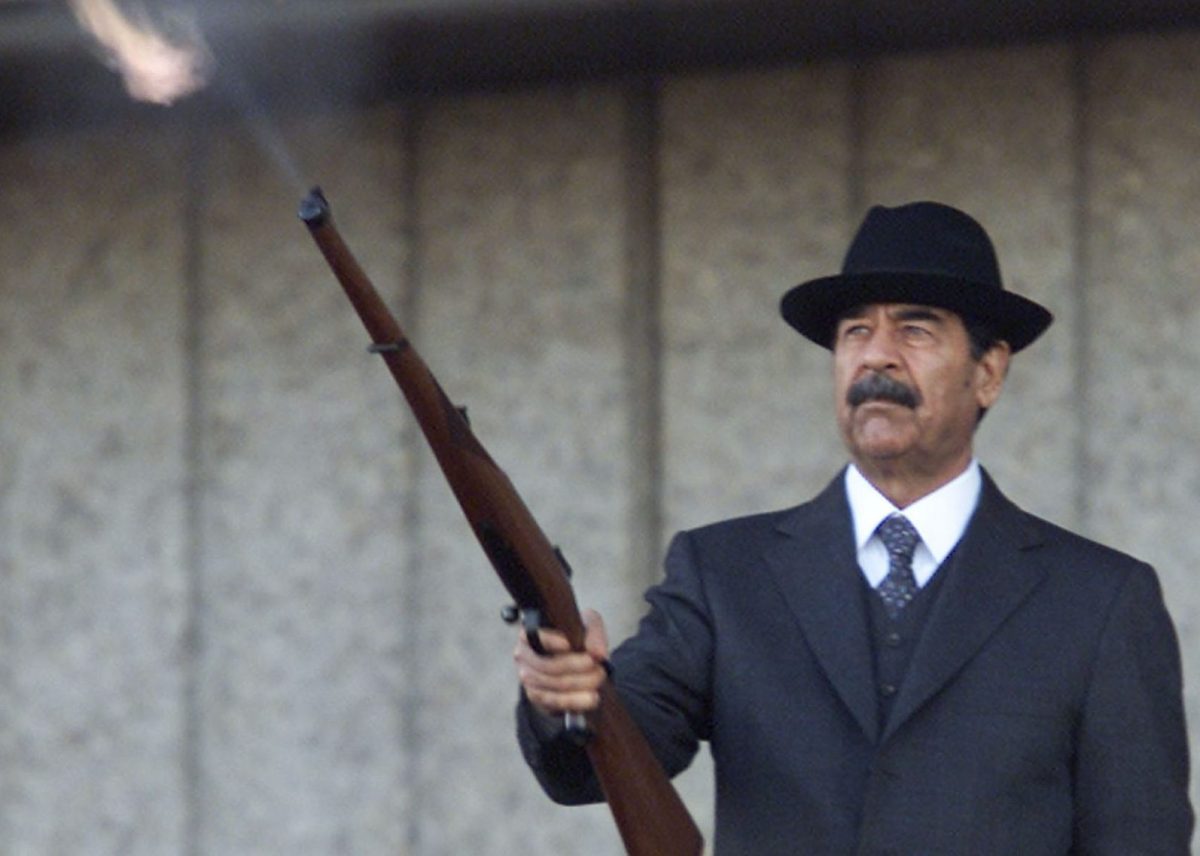[ad_1]
It was no surprise that the first Arab nation on Joe Biden’s must-call list was Iraq, a state whose destiny has been entwined with America’s for three decades. The timing of the call, however, was interesting.
The US president called Iraqi Prime Minister Mustafa al-Kadhimi on February 23, the eve of the 30th anniversary of the US-led coalition ground assault that freed Kuwait from Iraqi occupation, but in the process triggered a chain of events from which Iraq has still not recovered. After considering the cascade of events since then, there is surely an argument to be made for the US to reconsider its role in the Middle East.
Saddam Hussein’s madness had put Iraq’s future on hold, where it remains today, and drew the US into a quagmire that grips it still.
The first Gulf War, which ended 30 years ago, was one of the shortest conflicts in history. Saddam invaded Kuwait on August 2, 1990. The US, which at the time was heavily dependent on Persian Gulf oil, brought together a coalition of nations and over the next few months built up a vast army on Saudi Arabia’s border.
This was Desert Shield, the operation to defend the kingdom. On January 17, 1991, it became Desert Storm, a 41-day aerial campaign followed by a ground assault that liberated Kuwait and destroyed Saddam’s army in just four days.
But on February 28, 1991, the entire Middle East stood at a crossroads.
With the remnants of Saddam’s army forced back deep into Iraqi territory and the bodies of thousands of its soldiers scattered across the desert, US president George H W Bush had a crucial decision to make. Press on and overthrow Saddam? Or declare “mission accomplished†and pull out his troops?
At the time, Option A seemed riskier. Advisers argued that the cost in American lives would be too high, that the US would lose the support of its Arab coalition partners and that whoever replaced Saddam might be just as bad.
But as history tells us, the decision to go with Option B lit a fuse. Within a decade, the Americans would be back, and this time the cost – to the US, Iraq and the entire region – would be incalculably higher.
America’s return to Iraq in 2003 was the indirect product of another unenviable choice. The decision by King Fahd to allow American troops on to Saudi soil in 1990 was courageous – many argued against it. But the king was adamant – and right; under the circumstances it had to be done.
Among the Saudis who objected, however, was Osama bin Laden, the founder of al-Qaeda, which, with the support of the US, had been fighting the Soviets in Afghanistan. When the Soviets withdrew in 1989, bin Laden returned to Saudi Arabia, where in 1990 he spoke out against the king’s decision to invite Western troops on to the sacred soil.
Al-Qaeda’s brief alliance of convenience with the US was over. Bin Laden was exiled, his citizenship was revoked, and al-Qaeda set its sights on the US. The Gulf War, in other words, led to the attacks of September 11, 2001, which in turn led to the 2003 invasion of Iraq.
Operation Iraqi Freedom began on March 20, 2003. Less than two months later, the second president Bush, George W, seemingly having finished the job his father had started, declared “mission accomplished.†But it wasn’t. Chaos and insurrection followed. It would be eight years before the majority of US troops pulled out. By then 4,500 Americans had been killed, along with tens of thousands of Iraqis.
The chaos of postwar Iraq also served as the breeding ground for Islamic State (ISIS), which by 2015 had seized a large swath of territory extending from Iraq to Syria and perpetrated a series of murderous outrages. And the rise of ISIS had yet another consequence – the opening of a door to further Iranian meddling throughout the region.
In the battles to destroy ISIS in Iraq and Syria, Iran found itself briefly on the same side as the Americans. But the proxy militias trained, armed and funded by Tehran are now ambassadors for Iran’s revolutionary message and political influence, especially in Iraq and Syria.
In his call to Iraqi Prime Minister al-Kadhimi, Biden focused on the recent spate of rocket attacks in the country, including on the US Embassy in Baghdad and a coalition airbase in Erbil, where one contractor was killed on February 15. Within days of the call, Biden authorized a US strike on “multiple facilities located at a border control point used by a number of Iranian-backed militant groups.†About 17 fighters were killed.
There is a depressing circularity to all of this.
Thirty years ago, the Gulf states needed American protection against the insanity of Saddam Hussein. Today, the Gulf Cooperation Council states are more than capable of manning their own barricades, and of forming a united front against Iran – or, indeed, of working to come to terms with their neighbor.
Since the end of the Gulf War it has been clear that it is the physical presence of US forces in the region that has been the “recruiting sergeant†for the extremists. If Biden can find the courage to resist the political pressure to act tough, he can do the right thing – for America and for the Middle East.
The US has been policing the Middle East for 30 years and every action it has taken has made matters worse, not better. The “sheriff†needs to hang up his badge and gun.
This article was provided by Syndication Bureau, which holds copyright.
Jonathan Gornall is a British journalist, formerly with The Times, who has lived and worked in the Middle East and is now based in the UK.
[ad_2]
Source link











